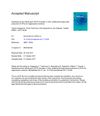 46 citations,
August 2019 in “Journal of Ethnopharmacology”
46 citations,
August 2019 in “Journal of Ethnopharmacology” Eclipta prostrata has many traditional uses and health benefits, but more research is needed to understand how it works and ensure it's safe.
 46 citations,
December 1992 in “Journal of Investigative Dermatology”
46 citations,
December 1992 in “Journal of Investigative Dermatology” Minoxidil decreases LH expression, while hydralazine has mixed effects on prolyl and lysyl hydroxylase activities.
 46 citations,
August 1990 in “The Journal of clinical endocrinology and metabolism/Journal of clinical endocrinology & metabolism”
46 citations,
August 1990 in “The Journal of clinical endocrinology and metabolism/Journal of clinical endocrinology & metabolism” Ketoconazole reduced hair growth and improved acne in women, but caused side effects needing careful monitoring.
 45 citations,
August 2019 in “Dermatologic Therapy”
45 citations,
August 2019 in “Dermatologic Therapy” Hair loss treatments work better with lifestyle changes.
 45 citations,
November 2017 in “Biomaterials”
45 citations,
November 2017 in “Biomaterials” Researchers found a new way to create hair-growing structures in the lab that can grow hair when put into mice.
 45 citations,
March 2015 in “Clinical Endocrinology”
45 citations,
March 2015 in “Clinical Endocrinology” Testosterone therapy is generally safe for transmen, improves sexual function, and has manageable health risks with proper monitoring.
 45 citations,
January 2013 in “Journal of Human Reproductive Sciences”
45 citations,
January 2013 in “Journal of Human Reproductive Sciences” Women with PCOS are more likely to have fatty liver disease, especially if they have metabolic problems.
 45 citations,
July 2009 in “Journal of Investigative Dermatology”
45 citations,
July 2009 in “Journal of Investigative Dermatology” The S100A4 protein is more common in psoriatic skin and could be a target for treating psoriasis.
 45 citations,
February 2001 in “Joint bone spine”
45 citations,
February 2001 in “Joint bone spine” Gonadal dysgenesis, like Turner's and Klinefelter's syndromes, negatively affects bone health, but hormone treatments can help.
 45 citations,
September 1998 in “Journal of Investigative Dermatology”
45 citations,
September 1998 in “Journal of Investigative Dermatology” The enzyme 17β-HSD type 2 mainly performs oxidation in human sebaceous glands, which may help protect against acne.
 44 citations,
June 2018 in “Journal of Cellular Physiology”
44 citations,
June 2018 in “Journal of Cellular Physiology” Researchers developed a 3D model of human hair follicle cells that can help understand hair growth and test new hair loss treatments.
 44 citations,
January 2013 in “International Journal of Trichology”
44 citations,
January 2013 in “International Journal of Trichology” Finasteride 5 mg/day effectively treats hair loss in postmenopausal women without hyper-androgenism.
 44 citations,
January 2010 in “International journal of trichology”
44 citations,
January 2010 in “International journal of trichology” Choosing the right shampoo for your hair type is crucial.
 44 citations,
June 2009 in “Biomaterials”
44 citations,
June 2009 in “Biomaterials” Skin cell clumping for hair growth is improved by a protein called fibronectin, which helps cells stick and move better.
 44 citations,
December 1991 in “Annals of the New York Academy of Sciences”
44 citations,
December 1991 in “Annals of the New York Academy of Sciences” EGF and FGF help hair growth by affecting cell differentiation and fiber growth.
 43 citations,
January 2013 in “Indian Journal of Dermatology, Venereology and Leprology”
43 citations,
January 2013 in “Indian Journal of Dermatology, Venereology and Leprology” The article concludes that advancements in hair cosmetics require dermatologists to stay informed about products and their potential risks, including allergies and higher risks for hairdressers.
 43 citations,
August 2018 in “Cell Stem Cell”
43 citations,
August 2018 in “Cell Stem Cell” Hoxc genes control hair growth through Wnt signaling.
 43 citations,
September 2001 in “Scanning”
43 citations,
September 2001 in “Scanning” Hair treatments like bleaching increase friction by exposing tiny pores on the hair surface.
 43 citations,
January 1977 in “Toxicology and Applied Pharmacology”
43 citations,
January 1977 in “Toxicology and Applied Pharmacology” Minoxidil is mostly safe, but high doses can cause electrolyte imbalances and heart issues in dogs.
 42 citations,
February 2021 in “Signal Transduction and Targeted Therapy”
42 citations,
February 2021 in “Signal Transduction and Targeted Therapy” Hair follicle regeneration possible, more research needed.
 42 citations,
February 2017 in “Scientific Reports”
42 citations,
February 2017 in “Scientific Reports” Researchers found a way to create cells from stem cells that act like human cells important for hair growth and could be used for hair regeneration treatments.
 42 citations,
January 2017 in “Stem cells international”
42 citations,
January 2017 in “Stem cells international” Adding hyaluronic acid helps create larger artificial hair follicles in the lab.
 42 citations,
July 2015 in “Cosmetics”
42 citations,
July 2015 in “Cosmetics” Nanotechnology improves hair care products by enhancing ingredient stability, targeting treatment, and reducing side effects, but more research on its toxicity is needed.
 42 citations,
August 1999 in “The American journal of pathology”
42 citations,
August 1999 in “The American journal of pathology” Basal cell carcinomas have much higher levels of Vitamin D3 receptors compared to healthy skin.
 41 citations,
June 2013 in “PLOS ONE”
41 citations,
June 2013 in “PLOS ONE” Engineered skin substitutes can grow hair but have limitations like missing sebaceous glands and hair not breaking through the skin naturally.
 41 citations,
September 2010 in “Journal of dermatological science”
41 citations,
September 2010 in “Journal of dermatological science” Bone marrow and umbilical cord stem cells can help grow new hair.
 41 citations,
June 2010 in “Anais Brasileiros de Dermatologia”
41 citations,
June 2010 in “Anais Brasileiros de Dermatologia” Isotretinoin is safe and effective for acne, with common side effects like dry lips; serious side effects are rare.
 41 citations,
March 2007 in “Journal of dermatological science”
41 citations,
March 2007 in “Journal of dermatological science” Taking L-cystine and vitamin B6 can prevent hair loss caused by smoke in mice.
 41 citations,
March 2007 in “Steroids”
41 citations,
March 2007 in “Steroids” New methods to make oxasteroids show promise for medical treatments like osteoporosis and breast cancer.
 41 citations,
June 2006 in “Journal of Investigative Dermatology”
41 citations,
June 2006 in “Journal of Investigative Dermatology” Beard and scalp hair cells have different gene expressions, which may affect beard growth characteristics.






























